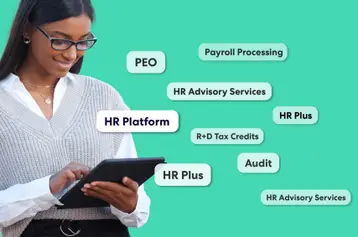What Can HRO Companies Bring to Businesses Like Yours?

Company leaders know that their employees are the backbone of their business. Supporting them with strong human resources services is a must. However, employing a full-service HR department isn't always viable for small and medium-sized businesses. Many companies are seeking alternatives to handling these tasks in-house, especially when it comes to enhancing cost efficiency. And it has become increasingly more common to look to human resource outsourcing companies for help.
Businesses that work with HRO companies can get help with:
- Payroll management and administration
- Employee benefits administration
- Talent management and recruitment
- HR compliance support and risk mitigation
- Employee training and development
- Performance management
- Technology
This article will take a close look at how companies that provide HR outsourcing can meet your specific needs as a business. But first, we'll look at the different types of HR outsourcing and the differences between their services.

Which HR model suits your business?
Take our quick assessment to find out if a PEO or ASO could be the best fit for your needs.
Types of HR Outsourcing
There are three main types of HR outsourcing services: professional employer organizations (PEOs), human resources outsourcing providers (HROs) and administrative services organizations (ASOs).
PEO
A PEO provides a comprehensive HR outsourcing solution for companies that want to outsource most of their HR functions. When a PEO and a client business contract to work together, they form a co-employment relationship. The PEO becomes the employer of record for payroll tax purposes. The PEO is responsible for calculating, withholding and remitting federal, state and local payroll taxes for the wages paid through its platform.
PEOs typically provide payroll services, benefits administration of PEO-sponsored benefits, workers’ compensation, recruitment tools, onboarding support, risk mitigation, HR administration and HR data analytics. PEOs also may provide greater access to a wider range of benefits than the business could obtain on its own.
HRO
Like a PEO, an HRO offers a wide range of HR outsourcing services. However, an HRO is not the co-employer or employer of record. HRO solutions often offer more flexibility in terms of selecting HR functions to outsource and customizing services according to the client's needs.
Services offered by HROs include payroll processing, benefits administration, recruitment tools, training tools, talent management and HR compliance support.
ASO
ASOs generally do not offer as broad a range of services as an HRO. And with an ASO, the business remains the employer of record.
An ASO typically offers services such as payroll processing, an HR software solution, employee benefits administration, HR consulting and regulatory compliance support. ASOs may provide more flexibility for clients to choose specific services to meet their unique needs.
These are three distinct levels of service. For the purposes of this guide, we're going to look through the broad lens of human resources outsourcing and the breadth of services you can expect to find, although the type of organization you choose will impact which services are available.
Core Services Offered by HR Outsourcing
Human resource outsourcing companies provide a comprehensive suite of services designed to streamline operations and reduce administrative burden for businesses of all sizes. These core offerings address fundamental HR challenges while allowing organizations to focus on their strategic objectives and core competencies.
Payroll services and management
Payroll processing is one of the most critical and complex administrative functions within any organization. It needs to run like a well-oiled machine so that employees get accurate paychecks on time.
HR providers specialize in delivering comprehensive payroll solutions that eliminate errors and optimize costs. Key components of outsourced payroll services include:
- Payroll processing and payroll tax administration. Complete end-to-end payroll processing, including salary calculations, payroll tax withholdings, remittance and direct deposits. Professional providers support federal, state and local payroll tax requirements with automated compliance support features that may reduce errors and penalties.
- Multi-state and global payroll capabilities. This capability becomes critical as companies expand geographically. They won’t need to build internal expertise for each location.
- Time tracking integration. Modern payroll outsourcing includes sophisticated time and attendance systems that integrate with payroll processing. These systems capture hours worked, overtime calculations and leave time.
- Compliance support on employment-related laws and regulations. Professional payroll providers maintain current knowledge of changing employment-related laws, minimum wage requirements, overtime regulations, reporting obligations and other functions.
- Employee self-service portals. Many providers offer online platforms where employees can update personal information and access pay stubs, payroll tax documents and other information. This reduces administrative queries and bolsters employee engagement.
Employee benefits administration
Benefits administration has become increasingly complex as organizations strive to attract and retain talent through competitive packages. Outsourcing benefits administration can enable companies to reduce internal administrative overhead.
Core benefits administration services include:
- Benefits program design and management. HR outsourcing companies can work with organizations to design competitive benefits packages that align with company culture and budgeting. This includes evaluating market trends, conducting benchmarking studies and recommending program structures.
- Enrollment and ongoing administration. Professional administrators manage the complex paperwork and communication required to keep benefits programs running smoothly. That includes managing open enrollment periods, life-event changes and termination processing
- Cost optimization strategies. Experienced providers can analyze utilization patterns, negotiate with vendors and recommend cost-optimization measures without compromising coverage quality.
- Healthcare and retirement plan coordination. Third-party providers can help manage relationships with insurance carriers, retirement plan administrators and other benefit vendors. They can also help with coordinating coverage changes, claims support and regulatory reporting requirements.
- COBRA administration. HRO providers can attend to the complex requirements of COBRA continuation coverage, including eligibility determination, notification requirements and premium collection.
Talent management and recruitment
Finding, attracting and retaining qualified talent is no easy feat—just ask any business owner. The complexity of these processes makes talent acquisition a natural candidate for outsourcing. Professional recruitment services bring specialized expertise, advanced technology and proven methods to hiring efforts.
Essential talent management services include:
- Talent acquisition and recruitment services. Human resources outsourcing providers can offer full-cycle recruiting services—from job posting and candidate sourcing through interviewing, background checks and offer management. Professional recruiters leverage extensive networks, advanced sourcing tools and industry expertise to identify top candidates.
- Staffing solutions for temporary and permanent roles. Some HR providers can provide flexible staffing solutions. This helps organizations scale their workforce based on business demands.
- Performance management systems. Services here might include implementation and administration of performance review processes, goal-setting frameworks and employee development programs that support both personal and organizational growth.
- Employee retention strategies. HR outsourcing companies can help you develop and implement programs designed to reduce turnover, including stay interviews, career development planning and recognition initiatives.
- Succession planning and leadership development. This might include identifying high-potential employees, creating development pathways and preparing internal candidates for advancement opportunities to reduce external recruitment needs.
Compliance and risk mitigation
Employment law compliance has become increasingly complex as regulations evolve at federal, state and local levels. Compliance issues are on the rise, too. A survey of more than 200 U.S. accounting, legal and consulting professionals found that 59% of companies “always” compromise on compliance due to business pressures.
That lack of compliance can get costly—and fast. Non-compliance can result in significant financial penalties, legal exposure and reputation damage. HR outsourcers may have expertise in maintaining current knowledge of employment regulations and implementing systems to mitigate compliance risks.
For human resources outsourcing, critical compliance support services include:
- Monitoring of employment-related laws.
- Risk mitigation strategies.
- Audit support and documentation.
- Training and policy development.
Advanced Strategic Services Provided by Human Resources Outsourcing
Today's businesses face increasingly sophisticated HR challenges that require "above and beyond" solutions. Businesses need help with specialized expertise, advanced technology and strategic thinking. Outsourcing can give companies access to cutting-edge capabilities without the substantial investment required to build internal expertise.
Workforce analytics and strategic planning
Today's competitive environment demands data-driven decision-making across all organizational functions. Third-party HR providers may have the tools and personnel to enable workforce analytics and strategic planning services such as:
- Workforce insights. Professional analytics tools collect and analyze comprehensive workforce data like performance metrics, engagement scores, retention patterns and productivity indicators. The data can reveal hidden trends, identify potential issues before they become critical and provide objective foundations for strategic decision-making.
- Predictive analytics for talent planning. HR outsourcing companies can provide advanced modeling techniques to forecast future workforce needs. These tools might, for example, identify flight risks among high-performers, predict hiring requirements or anticipate skill gaps before they impact operations. This forward-looking approach enables proactive talent management rather than reactive responses to workforce challenges.
- Performance metrics and KPI tracking. Comprehensive measurement and tracking systems can keep company leaders ahead of the curve on things like employee satisfaction, turnover rates, time-to-hire, training effectiveness and return on investment for HR initiatives.
- Strategic HR consulting. Experienced consultants can provide guidance on workforce strategy development, organizational design and other overarching issues. This expertise helps organizations align HR strategies with business objectives while implementing best practices proven across multiple industries.
Training and development programs
Savvy organizations recognize that comprehensive training programs directly impact retention, engagement and business performance. Providing training is only half the employee development equation.
A McKinsey survey reported that only one-quarter of respondents said their training programs measurably improved business performance.
Still, the demand for learning and development is rising in popularity, with 84% of employees stating they expect training from their employer. Effective and engaging training programs require a lot of resources that many organizations don't have. Outsourcing can fill this gap.
Essential training and development services from HR providers can include:
- Custom training program development. Professional instructional designers create training programs that address specific organizational needs, learning objectives and industry requirements.
- Leadership development initiatives. Comprehensive programs can be designed to identify, develop and retain high-potential employees while building leadership capabilities throughout the organization.
- Skills assessment and gap analysis. An HR outsourcing provider could compare workforce capabilities to strategic requirements and identify specific skill gaps that might impact performance and competitive positioning. The results could guide training investments and set baselines for measuring development progress.
- E-learning platform management. This might include administration and optimization of learning management systems, management of progress tracking and integration with other HR systems.
HR technology and process optimization
HR technology can provide more efficient processes, better employee experiences and enhanced decision-making. But investing in standalone tech systems without the accompanying expertise could lead to headaches.
The complexity of powerful human resource information systems (HRISs) make technology outsourcing a great option.
Core HR technology and optimization services include:
- HRIS implementation and management. Outsourcing spares a business the trouble of vendor selection, system configuration, data migration, user training and ongoing support. Professional implementation mitigates deployment risks and accelerates time-to-value.
- Process improvement initiatives. Regular process optimization by an HR provider leverages best practices, automation opportunities and workflow redesign to create streamlined operations.
- Technology integration, automation and support. Integration expertise may include API development, data mapping, workflow automation and ongoing maintenance of complex technology ecosystems.
Industry-Specific and Specialized Services
Organizations require providers who understand the operational nuances specific to their industry and geographic footprint. These specialized services go beyond one-size-fits-all solutions to deliver targeted expertise that addresses sector-specific needs.
Global workforce management
International expansion requires navigating diverse legal frameworks, payroll tax obligations and employment regulations that vary by jurisdiction.
Professional providers offer global workforce solutions including international expansion support through market entry guidance and compliance framework development.
Industry expertise
Deep knowledge has become a critical differentiator in HR outsourcing. Many providers develop specialization in sectors that have unique regulatory, operational or cultural requirements. For example:
- Healthcare organizations face stringent compliance requirements including HIPAA regulations and state licensing requirements that demand specialized knowledge and systems.
- Manufacturing companies require expertise in union relations, safety regulations and shift scheduling.
- Technology companies need providers who understand stock option administration, intellectual property considerations and the challenges of managing remote and contract workforces.
- Professional services firms require specialized support for project-based staffing, professional liability considerations and complex partnership structures.
Industry-focused HR providers can offer proven methodologies, regulatory expertise and benchmarking data specific to a sector. They can also maintain relationships with industry-specific vendors and service providers.
Scalability solutions
Outsourcing can make it easier for a business to scale its HR capabilities as it grows. For seasonal businesses, it also makes it easier to scale down a workforce.
Both the expertise and technology platforms of HR outsourcing companies can help a business expand in volume and into new states or countries without the need for significant infrastructure investments.
Business process outsourcing (BPO) involves outsourcing business functions, generally non-core aspects of the business. It is frequently used for things like customer service, supply chain management and IT services. BPO also can cover HR functions, like payroll processing and workforce management and provide scalable solutions.
In addition to scalability, BPO helps to free up business leaders' time so they can focus on business strategy and core objectives, helping them become more competitive in their markets.
How to Evaluate HR Outsourcing Companies
To ensure you choose a company that provides the HR functions you need, consider what tasks your current HR staff lacks the time or skills to handle. Use these gaps to start a list of what you'll need an HR service to provide.
From there, the following steps provide insight to help you toward a sound decision.
Factor in must-have specialty HR services
Some human resources outsourcing companies provide a wide range of services. This may include administrative tasks, payroll processing, employee benefits administration, talent management and more.
Others are more narrowly focused, perhaps covering certain essentials, like payroll services and payroll tax administration. When you assess your HR needs, you might notice that parts of your business require special expertise or attention. Maybe talent acquisition is an essential need for your growth in a difficult labor market.
When you consider HR outsourcing, look at the full scope of needs and related services and solutions. Your business operations will most likely gain the most from a single HR outsourcing service that can meet all of your organization's objectives.
Review compliance support services
Ask the outsourcing companies of interest about their security and privacy practices, including their data security policies.
See if they have expertise in the applicable local, state and federal employment-related rules and requirements that may affect your business. If you operate in a highly regulated industry, consider a company that has expertise in the specific industry.
Examine data management and analytics
A reliable small business HR outsourcing provider will be able to provide you with workforce analytics and data-driven insights to help you make informed decisions.
Assess their reputation, reviews and track record
One of the best ways to judge a company is to see what businesses like yours are saying about it. Do some research. Have they received any business awards or other accolades?
Read online customer reviews, ask for recommendations and check their track record for successes and failures. When you see and hear good things repeatedly, move that service provider closer to the top of your list.
Evaluate scalability and flexibility
Include your company's growth plans in your decision-making process. Choose an HR outsourcing company that can meet your business's demands and keep up with steep growth if they need to. They should be able showcase their ability to adapt to your changing needs as you scale.
Think about customer support
How attentive, astute and resourceful is the company's customer service? Slow response times and inexperienced customer service agents can make every HR function they address for you sluggish. Dig into their customer support levels to make sure they meet your standards of excellence.
Weigh the pricing structure
Price, while not always the sole determinant in business decisions, is an important factor. Narrow your list based on each company's:
- Standout features
- Reputation
- Breadth of service
- Customer support
Then, compare the pricing of your top HR outsourcing choices. Keep in mind that a higher upfront cost might make sense if the service provider includes comprehensive services, extra training and robust client support.
Deciding on Outsourced HR Services
In your search to outsource HR with the right provider, you may find several promising candidates. How can you decide which one will provide the right HR support for your business? We recommend using a systematic approach.
One effective method for choosing between top contenders is to use a scoring system. An objective comparison can provide clarity on which one best aligns with your priorities. Five elements to include in your scoring sheet are:
- Cultural fit. How do each company's core values and mission align with yours? A strong cultural fit may facilitate better communication, smoother collaboration and higher satisfaction.
- Price vs. service. What breadth of service does each company provide for their pricing? Don't get hung up on a dollar amount alone. Consider the overall value and return on investment (ROI) each option brings to the table.
- Company demo. Demos are illuminating and should carry a lot of weight in your decision. A quality demo can tip the scales, as can the company's ability to show they understand and can address your needs.
- Compatibility with current systems. Your current tech stack will have to integrate with an HR outsourcing company's platforms and HR software. If it doesn't, you will inevitably need more resources to complete tasks, which can decrease employee productivity.
- Expertise and specialization. An HR outsourcing provider with relevant expertise and/or specialized services may give you a competitive edge and cover your risk mitigation needs.
Record your findings on your scorecard and weigh them based on your company's unique requirements. The results can help you make an objective, informed decision.
Outsourcing HR with TriNet
Whether you want help with limited HR functions, like payroll processing and benefits administration, or need comprehensive HR services, there are many advantages to human resources outsourcing.
Many SMBs see it as a strategic move to strengthen their culture, increase employee satisfaction and free up time to focus on business growth. And more than 20,000 small businesses are using TriNet's HR outsourcing services.
If you're looking for an HR provider, TriNet offers several advantages. We can help you transform your HR into a powerful business asset. With our free HR assessment tool, you can answer a few simple questions and find out which HR solution is best for you.
Table of contents
- 1.Types of HR Outsourcing
- 2.PEO
- 3.HRO
- 4.ASO
- 5.Core Services Offered by HR Outsourcing
- 6.Payroll services and management
- 7.Employee benefits administration
- 8.Talent management and recruitment
- 9.Compliance and risk mitigation
- 10.Advanced Strategic Services Provided by Human Resources Outsourcing
- 11.Workforce analytics and strategic planning
- 12.Training and development programs
- 13.HR technology and process optimization
- 14.Industry-Specific and Specialized Services
- 15.Global workforce management
- 16.Industry expertise
- 17.Scalability solutions
- 18.How to Evaluate HR Outsourcing Companies
- 19.Factor in must-have specialty HR services
- 20.Review compliance support services
- 21.Examine data management and analytics
- 22.Assess their reputation, reviews and track record
- 23.Evaluate scalability and flexibility
- 24.Think about customer support
- 25.Weigh the pricing structure
- 26.Deciding on Outsourced HR Services
- 27.Outsourcing HR with TriNet






